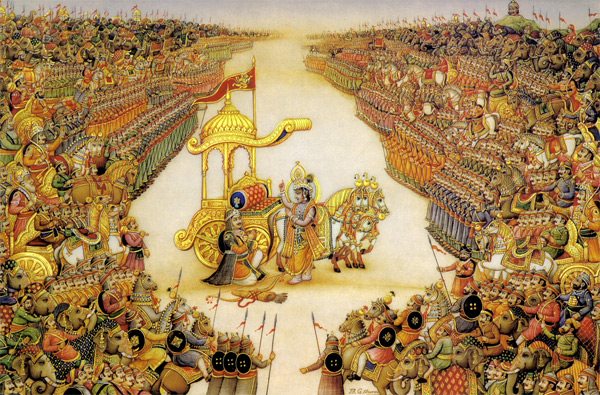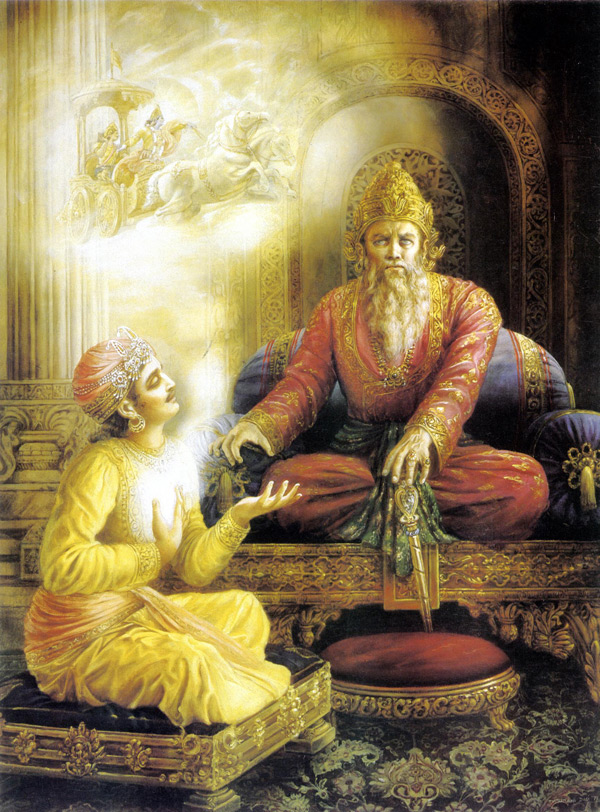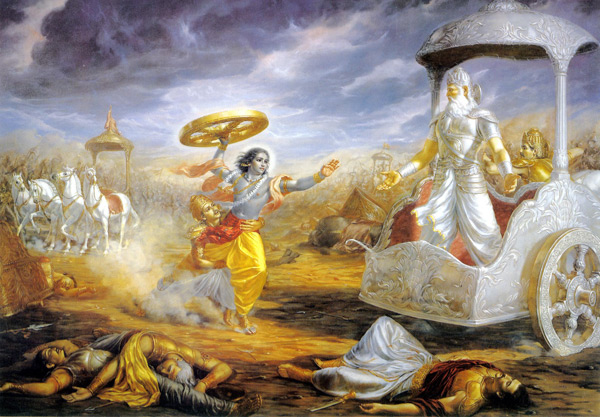The Mahabharata

Introduction
The Mahabharata is one of the two major Sanskrit epics of ancient India, the other being the Ramayana. It is an epic narrative of the Kurukshetra War and the fates of the Kaurava and the Pandava princes.
Historical and Cultural Context
Traditionally, the authorship of the Mahabharata is attributed to Vyasa. Its longest version consists of over 100,000 śloka or over 200,000 individual verse lines (each shloka is a couplet), and long prose passages. About 1.8 million words in total, the Mahabharata is roughly ten times the length of the Iliad and the Odyssey combined, or about four times the length of the Ramayana.
Key Elements
The epic contains many philosophical and devotional material, such as a discussion of the four "goals of life" or puruṣārtha. The most important philosophical discussion is the Bhagavad Gita, which is contained in the Bhishma Parva of the epic.
Structure and Composition
The Mahabharata is divided into 18 parvas or books, each containing several chapters. The epic's structure encompasses a wide range of narratives, stories, and philosophical discourses, intertwining various genres of literature, including history, myth, and moral teachings.
Central Themes
The Mahabharata addresses themes such as duty (dharma), righteousness, justice, and the consequences of one’s actions (karma). The complex interplay of fate and free will is also a recurring theme, highlighting the moral dilemmas faced by the characters.
Influence and Legacy
The Mahabharata has had a profound influence on Indian culture, religion, and philosophy. It has inspired numerous adaptations in literature, theater, television, and film. The Bhagavad Gita, as part of this epic, is revered as a sacred scripture and continues to guide spiritual and moral discourse worldwide.
Moral Lessons
The Mahabharata offers timeless lessons on life’s complexities, the importance of standing by one's principles, the consequences of greed and pride, and the need for forgiveness, compassion, and understanding.
Notable Stories and Characters
- The Pandavas and Kauravas: The central characters of the epic, two groups of cousins fighting for the throne of Hastinapura.
- Draupadi's Swayamvara: The contest where Arjuna wins Draupadi's hand in marriage.
- The Game of Dice: A pivotal moment where the Pandavas lose their kingdom and are exiled.
- The Bhagavad Gita: Krishna's counsel to Arjuna on the battlefield of Kurukshetra.
- Bhishma's Vow: The story of Bhishma's lifelong celibacy and his unparalleled devotion to duty.
- Karna's Identity: The revelation of Karna's true heritage as the eldest son of Kunti, which adds complexity to the battle of Kurukshetra.
- Abhimanyu's Valor: The young warrior Abhimanyu's heroic entry into the Chakravyuha formation and his tragic death during the war.
- Yudhishthira's Wisdom: Yudhishthira's encounter with a mystical crane (Yaksha) that tests his wisdom through a series of moral questions.
- Drona's Betrayal: The story of how Drona, the Pandavas' teacher, is tricked into laying down his arms, leading to his demise.
- Gandhari's Curse: The heartbroken mother Gandhari curses Krishna, blaming him for the destruction of her sons in the war.
- The Rajasuya Yajna: Yudhishthira's grand sacrifice that declares him as the emperor, and the fateful insult to Duryodhana during the event.
- Ekalavya's Sacrifice: The tale of Ekalavya, who sacrifices his thumb as a tribute to Drona, despite never being accepted as his disciple.
- Shakuni's Deceit: Shakuni's plotting, which leads to the downfall of the Pandavas and the ultimate conflict between the cousins.
- Krishna's Peace Proposal: Krishna's attempt to mediate peace between the Pandavas and Kauravas, which ultimately fails, leading to war.
- Bhima and Duryodhana's Duel: The final battle between Bhima and Duryodhana, where Bhima strikes a fatal blow, fulfilling his vow.

Important Teachings
- Dharma (Righteousness): The importance of following one's duty and moral law.
- Karma: The law of cause and effect, emphasizing the importance of right action.
- Loyalty and Honor: Exemplified by characters like Bhishma and Karna.
- The Futility of War: Despite being a war epic, the Mahabharata ultimately shows the devastating effects of conflict.
- Divine Intervention: The role of gods, particularly Krishna, in human affairs.
- The Complexity of Morality: The epic often presents moral dilemmas with no clear right answer.
- Selflessness: The value of sacrificing personal desires for the greater good, as seen in Arjuna's moral struggle.
- Leadership: The qualities of good leadership, exemplified by Yudhishthira’s decisions and responsibilities as a king.
- Humility: The importance of humility, shown through characters who choose righteousness over ego.
- Resilience: Overcoming adversity through perseverance, as demonstrated by the Pandavas during their exile.
- Forgiveness: The value of forgiveness, especially seen in Yudhishthira’s actions after the war.
- Justice: Upholding justice even in difficult situations, illustrated by the trials and decisions made by the Pandavas.
- Consequences of Pride: The destructive nature of pride, highlighted by Duryodhana’s downfall.
- Friendship: The bond of true friendship, exemplified by Krishna and Arjuna’s relationship.
- Compassion: The need for compassion, as seen in Bhishma’s advice and decisions during the war.
- Patience: The virtue of patience, illustrated by the Pandavas waiting through years of exile.
- Detachment: Learning to detach from material desires, as Krishna teaches in the Bhagavad Gita.
- Truthfulness: The significance of truth, upheld by Yudhishthira throughout the epic.
- Equality: The recognition of all beings as equal, highlighted by the Mahabharata’s many teachings on caste and duty.
- Wisdom of Elders: The respect for elders and their wisdom, especially seen in Bhishma’s guidance.
- Generosity: The importance of charity and generosity, demonstrated by Karna’s actions throughout his life.
- Family Loyalty: The complexity of family loyalty and duty, as portrayed by the relationships between the Kauravas and Pandavas.
- Integrity: Staying true to one’s word, shown through Bhishma’s vow and Karna’s promises.
- Spirituality: The pursuit of spiritual growth and enlightenment, emphasized by Krishna’s teachings to Arjuna.
- Non-attachment: The concept of non-attachment to the outcomes of actions, a core teaching of the Bhagavad Gita.
- Peace: The importance of striving for peace over conflict, as Krishna attempts to mediate between the cousins.
- Destiny vs. Free Will: The delicate balance between fate and free will, discussed throughout the epic.
- Consequences of Deceit: The downfall caused by deceit, as seen in Shakuni’s manipulation of the dice game.
- Respect for Women: The role and respect for women, shown through Draupadi’s dignity despite her suffering.
- Service: The value of serving others selflessly, exemplified by the characters who support the Pandavas.
- Mental Strength: The importance of mental fortitude, as Arjuna faces his inner conflicts before the battle.
- Guidance: The role of a mentor or guide, like Krishna’s role as Arjuna’s charioteer and spiritual guide.
- Unity in Diversity: The coexistence of various cultures and beliefs, as the Mahabharata brings together diverse elements of society.
- Respect for Teachers: The reverence for gurus, despite their human flaws, as seen in the relationship between Drona and his students.
- Revenge: The destructive nature of seeking revenge, highlighted by the ongoing conflict between the cousins.
- Forging Alliances: The strategic importance of forming alliances, as the Pandavas gain support from various kingdoms.
- Trust: The consequences of misplaced trust, as Duryodhana trusts Shakuni’s devious plans.
- Endurance: The need for endurance during tough times, as the Pandavas endure exile with grace.
- Righteous Rule: The ideal of righteous governance, exemplified by Yudhishthira’s just reign.
- Equality in Friendship: The friendship between Krishna and Arjuna shows the equality and mutual respect in true friendships.
- Value of Education: The critical role of education, emphasized through the training of the Pandavas and Kauravas under Drona.
- Faith: The power of faith in divine will, seen through the devotion of the Pandavas to Krishna.
- Listening to Good Advice: The downfall of characters like Duryodhana, who ignore wise counsel.
- Facing Fear: The courage to face one's fears, as Arjuna confronts his doubts before battle.
- Balancing Emotion with Reason: The balance between emotion and reason, highlighted in Krishna’s advice to Arjuna to control his emotions.
- Facing Consequences: The inevitable consequences of one’s actions, as each character faces the outcomes of their choices.
- Self-Reflection: The importance of self-reflection, as seen when Yudhishthira contemplates his actions and responsibilities.
- Impermanence of Life: The transient nature of life and material wealth, a recurring theme in the Mahabharata.
- Compassion for Enemies: Showing compassion even towards enemies, as seen in the way the Pandavas treat fallen Kauravas.
- Fulfilling Promises: The sacredness of vows and promises, illustrated by Bhishma’s vow of celibacy and duty.
- Role of Women in Society: The complex roles of women, as portrayed by characters like Draupadi and Kunti, who display strength and resilience.
- The Illusion of Power: The futility of chasing power and wealth, as Duryodhana’s greed leads to his destruction.
- Renewal and Rebirth: The cycles of destruction and renewal, a metaphor for personal growth and transformation.
- Importance of Gratitude: The value of being grateful for what one has, a teaching that runs through the narrative of the Pandavas.
- Hope: Maintaining hope even in the darkest of times, as the Pandavas never give up despite the hardships they face.
Famous Quotes
- "I am Time grown old to destroy the world." - Krishna
- "The greatest enemy is one's own self." - Yudhishthira
- "There is no greater force than destiny." - Bhishma
- "Victory attained by violence is tantamount to a defeat, for it is momentary." - Attributed to the Mahabharata
- "In the battlefield of life, the real victory is the conquest of oneself." - Arjuna
- "What is right is not always popular, and what is popular is not always right." - Krishna
- "A person is made great by their actions, not by their birth." - Karna
- "True strength is not the absence of weakness but the ability to overcome it." - Bhima
- "The mind is everything; what you think, you become." - Yudhishthira
- "Forgiveness is the noblest form of revenge." - Krishna
- "Live according to your dharma; the path of righteousness is the path to true fulfillment." - Vyasa
- "An individual’s greatness is determined by their character, not their status." - Kunti
- "A warrior is one who fights for justice, not for personal gain." - Arjuna
- "Knowledge is the greatest weapon; use it wisely." - Bhishma
- "We are shaped by our thoughts; we become what we think." - Krishna
- "Desire is the root of all suffering; conquer your desires." - Yudhishthira
- "The true measure of a leader is how well they serve others." - Drona
- "In the face of adversity, courage is the true mark of a hero." - Arjuna
- "A true friend is one who stands by you in your darkest hour." - Draupadi
- "The fruits of action are not to be desired; act for the sake of duty." - Krishna
- "Victory is not merely the absence of defeat but the presence of righteousness." - Bhishma
- "Life is a journey; the path is as important as the destination." - Vyasa
- "Even the greatest of warriors can fall; humility is key." - Dronacharya
- "The only way to conquer fear is to face it." - Arjuna
- "Suffering is a part of life; it teaches us valuable lessons." - Kunti
- "Real strength lies in the ability to forgive." - Krishna
- "Happiness is found in selflessness, not selfishness." - Draupadi
- "Wisdom is knowing what to do; virtue is doing it." - Yudhishthira
- "The world is a reflection of our actions; act wisely." - Bhima
- "Your destiny is shaped by your actions, not by your desires." - Krishna
- "In times of crisis, the true nature of a person is revealed." - Bhishma
- "Hope is the light that guides us through darkness." - Arjuna
- "A noble heart does not hold onto anger; it seeks peace." - Kunti
- "It is better to live one day as a lion than a hundred years as a sheep." - Karna
- "Understanding is deeper than knowledge; there are many who know you, but very few who understand you." - Drona
- "Your duty is to act, but never to the fruits of your actions." - Krishna
- "Pride precedes a fall; humility leads to true greatness." - Yudhishthira
- "Every end is a new beginning; embrace change." - Vyasa
- "To err is human, to forgive divine." - Krishna
- "Strength is not just physical; it is also emotional and mental." - Bhima
- "One should not be too proud of victories; remember that defeat is a part of life." - Arjuna
- "Compassion is the essence of humanity." - Kunti
- "True wisdom is knowing when to speak and when to remain silent." - Dronacharya
- "Life is fleeting; cherish each moment." - Krishna
- "Peace comes from within; do not seek it without." - Arjuna
- "Respect those who have earned it; it is a mark of a true leader." - Bhishma
- "Life is a test of character; your actions define you." - Yudhishthira
- "Every conflict holds the potential for resolution; seek understanding." - Krishna
- "A wise person learns more from their enemies than a fool from their friends." - Karna
- "The journey of a thousand miles begins with a single step." - Vyasa

